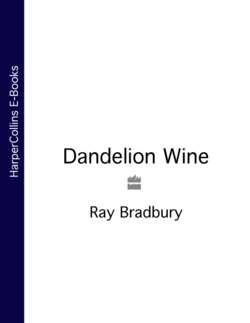Читать книгу Dandelion Wine - Рэй Брэдбери, Ray Bradbury, Ray Bradbury Philip K. Dick Isaac Asimov - Страница 9
ОглавлениеYou did not hear them coming. You hardly heard them go. The grass bent down, sprang up again. They passed like cloud shadows downhill … the boys of summer, running.
Douglas, left behind, was lost. Panting, he stopped by the rim of the ravine, at the edge of the softly blowing abyss. Here, ears pricked like a deer, he snuffed a danger that was old a billion years ago. Here the town, divided, fell away in halves. Here civilization ceased. Here was only growing earth and a million deaths and rebirths every hour.
And here the paths, made or yet unmade, that told of the need of boys traveling, always traveling, to be men.
Douglas turned. This path led in a great dusty snake to the ice house where winter lived on the yellow days. This path raced for the blast-furnace sands of the lake shore in July. This to trees where boys might grow like sour and still-green crab apples, hid among leaves. This to peach orchard, grape arbor, watermelons lying like tortoise-shell cats slumbered by sun. That path, abandoned, but wildly swiveling, to school! This, straight as an arrow, to Saturday cowboy matinees. And this, by the creek waters, to wilderness beyond town …
Douglas squinted.
Who could say where town or wilderness began? Who could say which owned what and what owned which? There was always and forever that indefinable place where the two struggled and one of them won for a season to possess a certain avenue, a dell, a glen, a tree, a bush. The thin lapping of the great continental sea of grass and flower, starting far out in lonely farm country, moved inward with the thrust of seasons. Each night the wilderness, the meadows, the far country flowed down-creek through ravine and welled up in town with a smell of grass and water, and the town was dis-inhabited and dead and gone back to earth. And each morning a little more of the ravine edged up into town, threatening to swamp garages like leaking rowboats, devour ancient cars which had been left to the flaking mercies of rain and therefore rust.
‘Hey! Hey!’ John Huff and Charlie Woodman ran through the mystery of ravine and town and time. ‘Hey!’
Douglas moved slowly down the path. The ravine was indeed the place where you came to look at the two things of life, the ways of man and the ways of the natural world. The town was, after all, only a large ship filled with constantly moving survivors, bailing out the grass, chipping away the rust. Now and again a lifeboat, a shanty, kin to the mother ship, lost out to the quiet storm of seasons, sank down in silent waves of termite and ant into swallowing ravine to feel the flicker of grasshoppers rattling like dry paper in hot weeds, become soundproofed with spider dust and finally, in avalanche of shingle and tar, collapse like kindling shrines into a bonfire, which thunderstorms ignited with blue lightning, while flash-photographing the triumph of the wilderness.
It was this then, the mystery of man seizing from the land and the land seizing back, year after year, that drew Douglas, knowing the towns never really won, they merely existed in calm peril, fully accoutered with lawn mower, bug spray and hedge shears, swimming steadily as long as civilization said to swim, but each house ready to sink in green tides, buried forever, when the last man ceased and his trowels and mowers shattered to cereal flakes of rust.
The town. The wilderness. The houses. The ravine. Douglas blinked back and forth. But how to relate the two, make sense of the interchange when …
His eyes moved down to the ground.
The first rite of summer, the dandelion picking, the starting of the wine, was over. Now the second rite waited for him to make the motions, but he stood very still.
‘Doug … come on … Doug …!’ The running boys faded.
‘I’m alive,’ said Douglas. ‘But what’s the use? They’re more alive than me. How come? How come?’
And standing alone, he knew the answer, staring down at his motionless feet …
